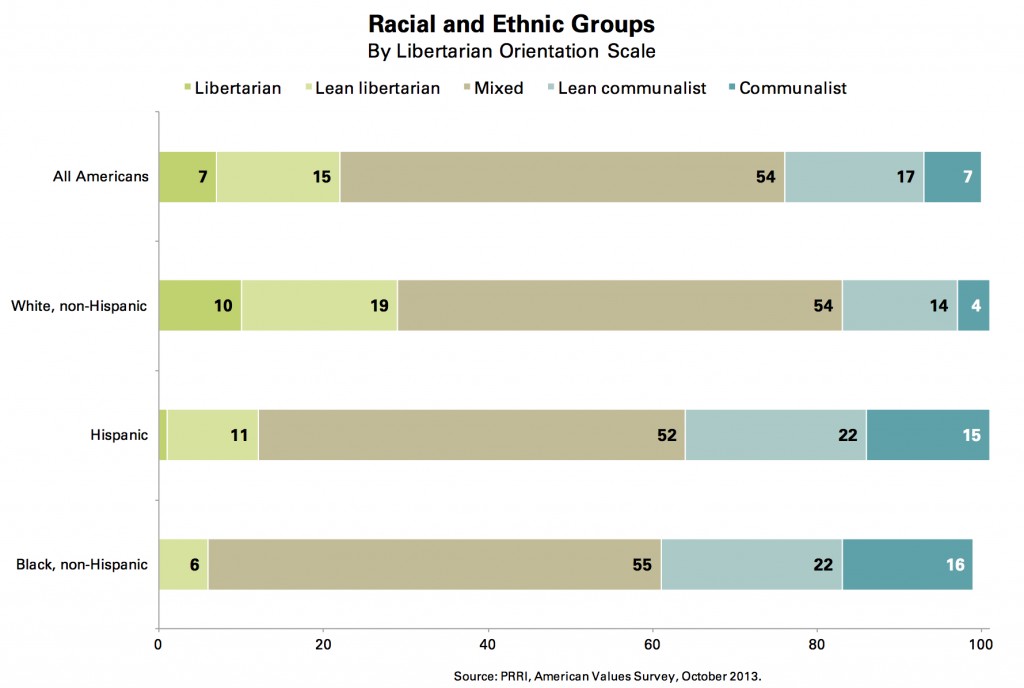From an exchange on Twitter.

How does a current factoid about the current racial makeup of libertarians support your assertion: “A libertarian society will be majority white.”
Let’s say that from 2009 to 2024 99% of bitcoiners are whites. This would not justify the assertion “in the future 99% of bitcoiners would be white.” You would need an argument, someting connecting whiteness with bitcoinness.
For libertarianism, I can imagine some arguments you could supply (but have not, afaik) that connect “whiteness” with “being libertarian.” For example here is one possible argument: libertarianism requires high intelligence as well as a propensity for low-time preference, since it requires abstract thinking, curiosity, courage, the ability to understand complex historical, economic, and sociological concepts. These characteristics do not guarantee libertarian views, not sufficient, but they are arguably necessary. In short, libertarians are “superior” beings and only a subset of humans can ever superior enough to be libertarians.
Whites are superior in terms of IQ and the other related factors which explains why most libertarians are white and it also is why it’s reasonable to predict that going forward, the libertarian superior supermen will predominately come from the white race and only occasionally from the few outliers among the non-white races.
So that would be a somewhat coherent argument, but then it would be explicitly racialist, if not racist, and also it would be based on unfounded racist assumptions; it would be incomplete. I myself think this is a ridiculous view, but if you put it this way it lays bare the naked racialism underlying the claims that are now only implicit, and it would make clearer the assumptions your racialist reasoning is relying on that you could then be asked to prove. What’s next, pointing to unprincipled Popperian scientistic Charles Murray’s pseudoscientific work on race and IQ?
My personal view is that humans are basically all sapient and smart enough to grasp common sense concepts about the benefits of liberty, trade, property rights, and that there is no obvious intelligence barrier to any group being libertarian. In the present only a tiny minority of whites are libertarian anyway? If the “whites are superior” reasoning is right it doesn’t explain why 98% of all whites are still inferior statist-socialist idiots.
If liberty is ever to be achieved it will only be because a large mass of people have come to understand the practical and moral benefits of liberty. If it is ever achieved, it proves that it was not low IQ or intelligence that was the barrier. And if it’s not IQ then there is no reason to think only whites would be the ones escaping the socialist-statist way of thinking.
My view is that liberty may be possible. We do not yet know. If it emerges it won’t be because we (white?) libertarians were running around promoting it, but because it works and over time more and more people came to understand this. For example until the USSR fell in 1991 many people could still argue socialism was superior to capitalism. But that was a teaching moment and now millions of people are aware that free markets and private property work better and are essential to human production and prosperity. They learned this from watching history not from reading Hazlitt.
In my view the main hope for liberty is that because the primary source for wealth is the accumulation of technological knowledge, the human race can keep getting richer every generation. The richer we get the less excuse or need for aggression/crime, and the more people can afford to be “liberal” (cosmpolitan, toleratan, empathetic) and also to devote some time to the study of economics and poltiics. Also they will be witnessing in real time the benefits of capitalism, technology, freedom, information, knowledge, individualism, tolerance, cosmopolitanism–all little teaching moments that accumulate over time. Just as we see happening with bitcoin; more and more people will adopt it as its track record gets longer and they get comfortable with it. And so on. To my mind this is the only hope for liberty, but it also means that there is little we, as activists, can do to bring it about. All we can do is hope, and wait. Which also means that what we can do is recognize this fact and devote sufficient time and attention in our lives in a quasi-free society to trying to survive and flourish in this real world. That means not expecting activism to work, at least not any time soon; accepting reality as it is working to prosper in the face of the illiberal challenges we face.
In any case I don’t expect to see substantial liberty any time soon and if it’s ever achieved I don’t expect it to be “mostly white”.















Recent Comments